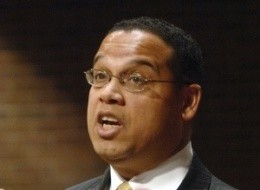Senate Democrats have drawn a line in the sand and they're sounding like they mean it. After efforts to raise the minimum wage were stymied by those champions of the small businessman, Senate Republicans, Dems are talking like people who've had an infusion of spinal fluid. Harry Reid has
vowed to block Congressional pay raises until a minimum wage increase is passed.
"We're going to do anything it takes to stop the congressional pay raise this year, and we're not going to settle for this year alone," Democratic Leader Harry Reid of Nevada said at a Capitol news conference.
Minimum wage workers haven't had a raise in 9 years. Our Congresspeople -- you know, the people that we pay with our tax dollars -- have had several. Their total "cost of living" increase works out to roughly $31,600 dollars. Having voted themselves increases that average out to about $15 per hour, granting minimum wage earners an increase of $2.10 over the next two years is the least they can do. Literally. In fact, as a remedy to the greater problem of poverty and wage disparity, it's fairly laughable. Tying together Congressional salaries and the minimum wage certainly makes for a great
rhetorical hook, but it's also very
safe political territory.
In contrast to the GOP leadership, the American public overwhelmingly favors a minimum wage increase. In fact, most Americans would be more likely to vote for a Congressional candidate who favors increasing the minimum wage.
I certainly hope they succeed in their efforts and put a little more money into the pockets of our lowest wage earners, but a little is exactly what it would be.
According to a Center on Budget and Policy Priorities analysis:
- The federal minimum wage has remained at $5.15 for nine years.
- Since its last increase in 1997, the minimum wage has lost 20 percent of its value.
- The minimum wage is at its lowest level in terms of purchasing power in fifty years.
- At 31 percent, the minimum wage is at its lowest as a share of the average American wage since 1947.
- It takes a full day of work for a minimum-wage worker to buy a tank of gas.
I just don't think incrementally raising the rate by a couple of dollars over the next two years will exactly lift people out of poverty. It is entirely possible that the price of gas per gallon, alone, will rise that much, or more, over the same time span.
I have, frankly, lost patience with rhetorical flourishes like this one from
Charles Schumer:
"It is shocking that in this Republican do-nothing congress, even the minimum wage is something that they won't go for," Schumer said.
There are many terms I would use to describe the Republican controlled Congress, but "do-nothing" is not one of them. I can't help wondering what focus groups helped Schumer pick that particular turn of phrase, but it is typically tin-eared. The GOP has accomplished one of the most massive transfers of wealth in American history. That's sure as hell not nothing. Democrats have done little to stop and many have voted with them on
numerous tax-cuts that have emptied the nation's coffers into the pockets of the very, very wealthy.
As
American Prospect points out, while only 12 percent of Americans currently fall below the poverty level, the fortunes of most Americans are falling relative to increases in the cost of living.
Today, with only 12 percent of Americans officially poor, the challenge of leadership is more complex. Yet four Americans in five have had basically stagnant living standards since the mid-1970s. That's because three decades of economic growth have gone almost entirely to the top, not merely the top 20 percent but mainly the top 1 percent.
In other words it isn't trickling down. The gap between average workers and the upper echelons of management is
ever-increasing.
Chief executive officers in the United States earned 262 times the pay of an average worker in 2005, the second-highest level in the 40 years for which there is data, a nonprofit think-tank said on Wednesday.
In fact, a CEO earned more in one workday than an average worker earned in 52 weeks, said the Economic Policy Institute in Washington, D.C.
Economist Paul Krugman has long claimed that we may, in fact, be entering another Gilded Age, with a new class of robber barons. In this
seminal piece originally published in the paper of record in 2002, he charts the thirty year rise of a new elite and the disappearance of the middle-class. To be super-wealthy is fashionable, once again, after a brief hiatus in the 50s and 60s. Sadly most Americans are in denial that these "tectonic shifts" have occurred. Says Krugman:
My sense is that few people are aware of just how much the gap between the very rich and the rest has widened over a relatively short period of time. In fact, even bringing up the subject exposes you to charges of ''class warfare,'' the ''politics of envy'' and so on. And very few people indeed are willing to talk about the profound effects -- economic, social and political -- of that widening gap.
Yet you can't understand what's happening in America today without understanding the extent, causes and consequences of the vast increase in inequality that has taken place over the last three decades, and in particular the astonishing concentration of income and wealth in just a few hands. To make sense of the current wave of corporate scandal, you need to understand how the man in the gray flannel suit has been replaced by the imperial C.E.O. The concentration of income at the top is a key reason that the United States, for all its economic achievements, has more poverty and lower life expectancy than any other major advanced nation. Above all, the growing concentration of wealth has reshaped our political system: it is at the root both of a general shift to the right and of an extreme polarization of our politics.
Last week the
Washington Post reported on the disappearance of the middle-class neighborhood.
Widening income inequality in the United States has been well documented in recent years, but the Brookings analysis of census data uncovered a much more accelerated decline in communities that house the middle class. It far outpaced the decline of seven percentage points between 1970 and 2000 in the proportion of middle-income families living in and around cities....
The Brookings study says that much more research is needed to better understand why middle-income neighborhoods are vanishing faster than middle-income families. But it speculates that a sorting-out process is underway in the nation's suburbs and inner cities, with many previously middle-income neighborhoods now tipping rich or poor.
As the article states, there is research to be done on why middle-class neighborhoods are disappearing faster than middle-income people, but I could point to a couple of possible reasons not addressed by the Post. The most obvious is that housing prices are terribly inflated, with even those little suburban matchboxes from time of yore going for sums unaffordable to the average wage earner. Beyond that much of the housing boom has been of the McMansion variety, marketing well-appointed, pre-fab monstrosities to the extraordinarily well-heeled. Housing prices have outstripped income growth for the majority of Americans. So the rapid polarization of American neighborhoods doesn't surprise me all that much.
I was raised by one of those men in a "gray flannel suit," Krugman describes. My grandfather was one of those men for whom capitalism had worked; rising from a working class background to the level of a top executive. But the excesses of the modern CEO would have sickened him.
He housed his family in one of those suburban matchboxes that sprung from the ground like so many mushrooms after WWII. He ran a large division of a major corporation and, as such, was the chief executive of one of the major employers of our town. It was a puzzlement to many why so many of the men who worked for my grandfather, lived in houses so much larger and grander. My grandfather was not given to such pretensions and couldn't see the point in heating so much unnecessary house. He lived a modest, if very comfortable, life.
At the time of his retirement, CEOs were earning a little more than 20 times the salaries of working stiffs. He thought that was too grave a disparity and argued with his executive colleagues about it. He was a product of a bygone era and with the advent of the Reagan years I saw him struggle with a kind of culture shock, as he watched the world go mad. He had survived the Great Depression, pulled himself up by his bootstraps, and lived the American Dream, as the New Deal made the rise of the middle-class possible. He watched it begin to slip away and raged against the dying of the light. I am only grateful that he did not live to see the rise of this new plutocracy because it would surely have killed him. Though I cannot help but wonder what he would have made of the Senators of the Democratic Party, to which he donated lavishly in his day, quibbling over an all-be-it very necessary $2 wage increase, while the entire middle-class way of life is disappearing.
 This was just dumb; alienating the liberal base months before an election. This is where Republicans beat us coming and going. They court their lunatic fringe. It keeps them in the fold, even when they don't get everything they want, and it keeps the Overton window moving farther and farther to the right. The "professional" Dems keep proving themselves to be idiots. They're still letting far right Republicans control the debate and control them.
This was just dumb; alienating the liberal base months before an election. This is where Republicans beat us coming and going. They court their lunatic fringe. It keeps them in the fold, even when they don't get everything they want, and it keeps the Overton window moving farther and farther to the right. The "professional" Dems keep proving themselves to be idiots. They're still letting far right Republicans control the debate and control them.







 Sleight of hand, indeed. Here,
Sleight of hand, indeed. Here, 


